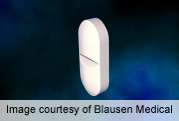New treatments outperforming placebo becoming less common

(HealthDay)—The efficacy of new medical treatments compared with placebo has sharply declined over the last few decades, suggesting that comparative effectiveness studies are needed, according to a study published in the June issue of Health Affairs.
Mark Olfson, M.D., M.P.H., from Columbia University in New York City, and Steven C. Marcus, Ph.D., from the University of Pennsylvania in Philadelphia, randomly selected and analyzed 315 placebo-controlled trials published in BMJ, the Journal of the American Medical Association, The Lancet, and the New England Journal of Medicine from 1966 to 2010.
The researchers found that the average effect size or average difference in efficacy fell significantly between the active treatment and placebo, from a peak odds ratio of 4.51 (1971 to 1980) to 1.36 (2001 to 2010).
"A decline in effect sizes in conventional placebo-controlled trials supports an increased emphasis on other avenues of research, including comparative studies on the safety, tolerability, and cost of treatments with established efficacy," Olfson and colleagues conclude.
More information:
Abstract
Full Text (subscription or payment may be required)
Health News Copyright © 2013 HealthDay. All rights reserved.




















